- Home
- Joanne Harris
Chocolat Page 12
Chocolat Read online
Page 12
“My timing?” She looks innocent. “You mean the Easter festival?” She gives a small, mischievous smile. “I rather thought your people were responsible for that. You ought to take it up with the Pope.”
I fix her with a cold stare., “I think you know exactly what I’m talking about.”
Again, that look of polite enquiry.
“Chocolate festival. All welcome.” My anger is rising like boiling milk, uncontrollable. For the instant I feel empowered, energized by its heat. I stab an accusing finger at her. “Don’t think I haven’t guessed what this is all about.”
“Let me guess.” Her voice is mild, interested. “It’s a personal attack on you. A deliberate attempt to undermine the foundations of the Catholic Church.” She gives a laugh which betrays itself in sudden shrillness. “God forbid that a chocolate shop should sell Easter eggs at Easter.” Her voice is unsteady, almost afraid, though of what I am unsure. The redhaired man glares at me. With an effort she recovers, and the glimpse of fear I thought I saw in her is swallowed by her composure.
“I’m sure there’s room here for both of us,” she says evenly. “Are you sure you don’t want a drink of chocolate? I could explain what I —”
I shake my head furiously, like a dog tormented by wasps. Her very calm infuriates me, and I can hear a kind of buzzing in my head, an unsteadiness which sends the room spinning about me. The creamy smell of chocolate is maddening. For a moment my senses are unnaturally enhanced; I can smell her perfume, a caress of lavender, the warm spicy scent of her skin. Beyond her, a whiff of the marshes, a musky tang of engine-oil and sweat and paint from her redhaired friend.
“I — no — I…” Nightmarishly, I have forgotten what I intended to say. Something about respect, I think, about the community. About pulling together in the same direction, about righteousness, decency, about morality. Instead I gulp air, my head swimming. “I — I…” I cannot shake the thought that she is doing this, pulling the threads of my senses apart, reaching into my mind. She leans forward, pretending solicitude, and her scent assails me once more.
“Are you all right?” I hear her voice from a great distance. “Monsieur Reynaud, are you all right?”
I push her away with trembling hands. “Nothing.” At last I manage to speak. “An — indisposition. Nothing. I’ll bid you good —” Blindly I stumble towards the door. A red sachet suspended from the door-jamb brushes my face more of her superstition — and I cannot shake off the absurd impression that the ridiculous thing is responsible for my malaise; herbs and bones sewn together and hung there to trouble my mind. I stagger out into the street, gasping for breath. My head clears as soon as the rain touches it, but I keep walking. Walking.
I did not stop until I reached you, mon pere. My heart was pounding, my face running with sweat, but at last I feel purged of her presence. Was this what you felt, mon pere, that day in the old chancery? Did temptation wear this face?
The dandelions are spreading, their bitter leaves pushing up the black earth, their white roots forking deep, biting hard. Soon they will be in bloom. I will walk home via the river, pare, to observe the small floating city which even now grows, spreads across the swollen Tannes. More boats have arrived since last we spoke so that the river is paved with them. A man might walk across.
EVERYONE WELCOME
Is this what she intends? A gathering of these people, a celebration of excess? How we fought to eradicate those remaining pagan traditions, pere, how we preached and cajoled. The egg, the hare, still-living symbols of the tenacious root of paganism, exposed for what they are. For a time we were pure. But with her the purge must begin anew. This is a stronger strain, defying us once again. And my flock, my stupid, trustful flock, turning to her, listening to her…Armande Voizin. Julien Narcisse. Guillaume Duplessis. Josephine Muscat. Georges Clairmont. They will hear their names spoken in tomorrow’s sermon along with all those who have listened to her. The chocolate festival is only a part of the sickening whole, I will tell them. The befriending of the river-gypsies. Her deliberate defiance of our customs and observances. The influence she brings to bear on our children. All signs, I will tell them, all signs of the insidious effect of her presence here.
This festival of hers will fail. Ridiculous to imagine that with such strength of opposition it could succeed. I will preach against it every Sunday. I will read out the names of her collaborators and pray for their deliverance. Already the gypsies have brought unrest. Muscat complains that their presence deters his customers. The noise from their camp, the music, the fires, have made Les Marauds into a floating shanty town, the river gleaming with spilled oil, drifts of litter sailing downstream. And his wife would have welcomed them, so I heard. Fortunately Muscat is not intimidated by these people. Clairmont tells me he ousted them easily last week when they dared to set foot in his cafe. You see, pere, in spite of their bravado they are cowards. Muscat has blocked off the path from Les Marauds to discourage them from passing. The possibility of violence should appal me, pere, but in a way I would welcome it. It might give me the excuse I need to call the police from Agen. I should talk to Muscat again. He would know what to do.
EIGHTEEN
Saturday, March 1
ROUX’S BOAT IS ONE OF THE NEAREST TO THE SHORE, moored some distance from the rest, opposite Armande’s house. Tonight paper lanterns were strung across its bows like glowing fruit, and, as we made our way into Les Marauds, we caught the sharp scent of grilling food from the river bank. Armande’s windows had been flung open to overlook the river, and the light from the house made irregular patterns on the water. I was struck by the absence of litter, the care with which every scrap of waste had been placed in the steel drums for burning. From one of the boats further downriver came the sound of a guitar playing. Roux was sitting on the little jetty, looking into the water. A small group of people had already joined him, and I recognized Zezette, another girl called Blanche and the North African, Mahmed. Beside them something was cooking on a portable brazier filled with coals.
Anouk ran to the fire at once. I heard Zezette warn her in a soft voice, “Careful, sweetheart, it’s hot.”
Blanche held out a mug containing warm spiced wine and I took it with a smile. “See what you think of this.”
The drink was sweet and sharp with lemon and nutmeg, the spirit so strong that it caught at the throat. For the first time in weeks the night was clear, and our breath made pale dragons in the still air. A thin mist hung over the river, lit here and there by the lights from the boats.
“Pantoufle wants some too,” said Anouk, pointing at the pan of spiced wine.
Roux grinned. “Pantoufle?”
“Anouk’s rabbit,” I told him quickly. “Her — imaginary friend.”
“I’m not sure Pantoufle would like this very much,” he told her. “Perhaps he’d like a little apple juice instead?”
“I’ll ask him,” said Anouk.
Roux seemed different here, more relaxed, outlined in fire as he supervised his cooking. I remember river crayfish, split and grilled over the embers, sardines, early sweetcorn, sweet potatoes, caramelized apples rolled in sugar and flash-fried in butter, thick pancakes, honey. We ate with our fingers from tin plates and drank cider and more of the spiced wine. A few children joined Anouk in a game by the river bank. Armande came down to join us too, holding out her hands to warm them by the brazier.
“If only I were younger,” she sighed. “I wouldn’t mind this every night.”She took a hot potato from its nest of coals and juggled it deftly to cool it. “This is the life I used to dream about as a child. A houseboat, lots of friends, parties every night…” She gave Roux a malicious look. “I think I’ll run away with you,” she declared. “I always had a soft spot for a redheaded man. I may be old, but I bet I could still teach you a thing or two.”
Roux grinned. There was no trace of self-consciousness in him tonight. He was good-humoured, filling and refilling the mugs with wine and cider, touchingly pleased to be th
e host. He flirted with Armande, paying her extravagant compliments, making her caw with laughter. He taught Anouk how to skim flat stones across the water. Finally he showed us his boat, carefully maintained and clean, the tiny kitchen, the storage hold with its water tank and food stores, the sleeping area with its plexiglass roof.
“It was nothing but a wreck when I bought it,” he told us. “I fixed it up so that now it’s as good as any house on land.” His smile was a little rueful, like that of a man confessing to a childish pastime. “All that work, just so I can lie on my bed at night and listen to the water and watch the stars.”
Anouk was exuberant in her approval. “I like it,” she declared. “I like it a lot! And it isn’t a mid — mid — whatever Jeannot’s mother says it is.”
“A midden,” suggested Roux gently. I looked at him quickly, but he was laughing. “No, we’re not as bad as some people think we are.”
“We don’t think you’re bad at all!” Anouk was indignant.
Roux shrugged.
Later there was music, a flute and a fiddle and some drums improvised from cans and dustbins. Anouk joined in with her toy trumpet, and the children danced so wildly and so close to the river bank that they had to be sent away to a safe distance. It was well past eleven when we finally left, Anouk drooping with fatigue but protesting fiercely.
“It’s OK,” Roux told her. “You can come back any time you like.”
I thanked him as I picked up Anouk in my arms.
“You’re welcome.” For a second his smile faltered as he looked beyond me to the top of the hill. A faint crease appeared between his eyes.
“What’s wrong?”
“I’m not sure. Probably nothing.”
There are few streetlights in Les Marauds. The only illumination comes from a single yellow lantern outside the Cafe de la Republique, shining greasily on the narrow causeway. Beyond that is the Avenue des Francs Bourgeois, broadening to a well-lit avenue of trees. He watched for a moment longer, eyes narrowed.
“I just thought I saw someone coming down the hill, that’s all. Must have been a trick of the light. There’s no one there now.”
I carried Anouk up the hill. Behind us, soft calliope music from the floating carnival. On the jetty Zezette was dancing, outlined against the dying fire, her frenzied shadow leaping below her. As we passed the Cafe de la Republique I saw that the door was ajar, though all the lights were out. From inside the building I heard a door close softly, as if someone had been watching, but that might have been the wind.
NINETEEN
Sunday, March 2
MARCH HAS BROUGHT AN END TO THE RAIN. The sky is raw now, a screeching blue between fast-moving clouds, and a sharpening wind has risen during the night, gusting in corners, rattling windows. The church bells ring wildly as if they too have caught a little of this sudden change. The weathervane turn-turns against the wheeling sky, its rusty voice rising shrilly. Anouk sings a wind-song to herself as she plays in her room:
V’la l’bon vent, V’la l’joli vent
V’la l’bon vent, ma vie m’appelle
V’la l’bon vent, V’la l’joli vent
V’la l’bon vent, ma mie m’attend.
March wind’s an ill wind, my mother used to say. But in spite of that it feels good, smelling of sap and ozone and the salt of the distant sea. A good month, March, with February blowing out of the back door and spring waiting at the front. A good month for change..
For five minutes I stand alone in the square with my arms held out, feeling the wind in my hair. I have forgotten to bring a coat and my red skirt billows out around me. I am a kite, feeling the wind, rising in an instant above the church tower, rising above myself. For a moment I am disorientated, seeing the scarlet figure below in the square, at once here and there — falling back into myself, breathless, I see Reynaud’s face staring out from a high window, his eyes dark with resentment. He looks pale, the bright sunlight barely grazing his skin with colour. His hands are clenched on the sill before him and his knuckles are the bleached whiteness of his face.
The wind has gone to my head. I send him a cheery wave as I turn to go back into the shop. He will see this as defiance, I know, but this morning I do not care. The wind has blown my fears away. I wave to the Black Man in his tower, and the wind plucks gleefully at my skirts. I feel delirious, expectant.
Some of this new courage seems to have infused the people of Lansquenet. I watch them as they walk to church, the children running into the wind with arms spread like kites, the dogs barking wildly at nothing, even the adults bright-faced, eyes streaming from the cold. Caroline Clairmont in a new spring coat and hat, her son holding her by the arm. For a moment Luc glances at me, gives me a smile hidden by his hand. Josephine and Paul Marie Muscat, arms entwined like lovers, though her face is twisted and defiant beneath her brown beret. Her husband glares at me through the glass and quickens his step, his mouth working. I see Guillaume, without Charly today, though he still carries the bright plastic lead dangling from one wrist, a forlorn figure oddly bereft without his dog. Arnauld looks my way and nods. Narcisse stops to inspect a tub of geraniums by the door, rubs a leaf between his thick fingers, sniffs the green sap. He is sweet-toothed in spite of his gruffness, and I know he will be in later for his mocha and chocolate truffles.
The bell slows to an insistent drone — domm! domm! — as the people make their way through the open doors. I catch another glimpse of Reynaud — white-cassocked now, hands folded, solicitous — as he welcomes them in. I think he looks at me again, a brief flicker of the eyes across the square, a subtle stiffening of the spine beneath the robe — but I cannot be sure.
I settle at the counter, a cup of chocolate in my hand, to await the end of Mass.
The service was longer than usual. I suppose that as Easter approaches Reynaud’s demands will become greater. It was over ninety minutes before the first people emerged furtively, heads bowed, the wind tugging impudently at headscarves and Sunday jackets, ballooning under skirts in sudden salaciousness, hurrying the flock across the square. Arnauld gave me a sheepish smile as he passed; no champagne truffles this morning. Narcisse came in as usual, but was even less communicative, pulling a paper out of his tweed coat and reading it in silence as he drank. Fifteen minutes later half the members of the congregation were still inside, and I guessed they must be awaiting confession. I poured more chocolate and drank. Sunday is a slow day. Better to be patient.
Suddenly I saw a familiar figure in a tartan coat slip through the half-open church door. Josephine glanced across the square, and, seeing it empty, ran across towards the shop. She noticed Narcisse and hesitated for a moment before deciding to come in. Her fists were clenched protectively in the pit of her stomach.
“I can’t stay,” she said at once. “Paul’s in confession. I’ve got two minutes.” Her voice was sharp and urgent, the hurried words falling over themselves like dominoes in a line.
“You have to stay away from those people,” she blurted. “The travellers. You have to tell them to move on. Warn them.” Her face worked with the effort of speaking. Her hands opened and closed.
I looked at her. “Please, Josephine. Sit down. Have a drink.”
“I can’t!” She shook her head emphatically. Her wind, tangled hair blurred wildly around her face. “I told you I don’t have time. Just do as I say. Please.” She sounded strained and exhausted, looking towards the church door as if afraid of being seen with me.
“He’s been preaching against them,” she told me in a fast, low tone. “And against you. Talking about you. Saying things.”
I shrugged indifferently. “So? What do I care?”
Josephine put her fists to her temples in a gesture of frustration. “You have to warn them,” she repeated. “Tell them to go. Warn Armande too. Tell her he read her name out this morning. And yours. He’ll read mine out as well if he sees me here, and Paul?”
“I don’t understand, Josephine. What can he do? And why should
I care, anyway?”
“Just tell them, all right?” Her eyes flicked warily to the church again, from which a few people were drifting. “I can’t stay,” she said. “I have to go.” She turned towards the door.
“Wait, Josephine?”
Her face as she turned back was a blur of misery. I could see that she was close to tears. “This always happens,” she said in a harsh, unhappy voice. “Whenever I find a friend he manages to ruin it for me. It’ll happen the way it always does. You’ll be well out of it by then, but me?”
I took a step forward, meaning to steady her. Josephine pulled back with a clumsy gesture of warding.
“No! I can’t! I know you mean well, but I just — can’t!” She recovered with an effort. “You have to understand. I live here. I have to live here. You’re free, you can go where you like, you?”
“So can you,” I replied gently.
She looked at me then, touching my shoulder very briefly with the tips of her fingers.
“You don’t understand,” she said without resentment. “You’re different. For a while I thought maybe I could learn to be different too.”
She turned, her agitation leaving her, to be replaced by a look of distant, almost sweet, abstraction. She dug her hands into her pockets once more.
“I’m sorry, Vianne,” she said. “I really tried. I know it isn’t your fault.” For a moment I saw a brief return of animation to her features. “Tell the river people,” she urged. “Tell them they have to go. It isn’t their fault either — I just don’t want anyone to be hurt,” finished Josephine softly. “All right?”
I shrugged. “No-one is going to be hurt,” I told her.
“Good.” She gave a smile painful in its transparency. “And don’t worry about me. I’m fine. I really am.” Again that stretched, painful smile. As she edged past me through the door I caught a glimpse of something shiny in her hand, and saw that her coat pockets were stuffed with costume jewellery. Lipsticks, compacts, necklaces and rings spilled from between her fingers.

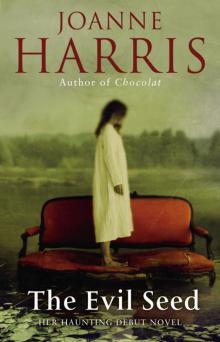 The Evil Seed
The Evil Seed Gentlemen and Players
Gentlemen and Players A Cat, a Hat, and a Piece of String
A Cat, a Hat, and a Piece of String Different Class
Different Class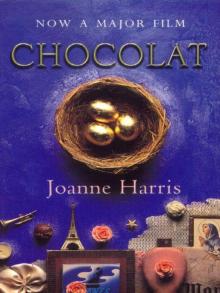 Chocolat
Chocolat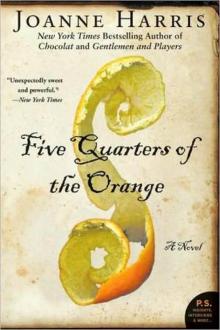 Five Quarters of the Orange: A Novel
Five Quarters of the Orange: A Novel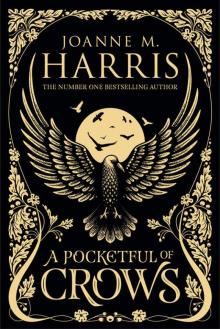 A Pocketful of Crows
A Pocketful of Crows Runelight
Runelight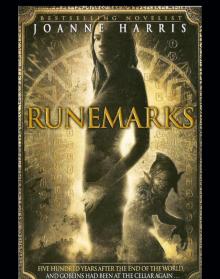 Runemarks
Runemarks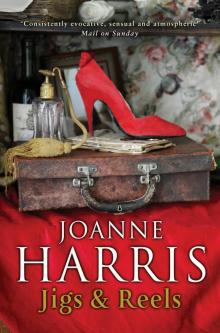 Jigs & Reels: Stories
Jigs & Reels: Stories Sleep, Pale Sister
Sleep, Pale Sister Holy Fools
Holy Fools The Testament of Loki
The Testament of Loki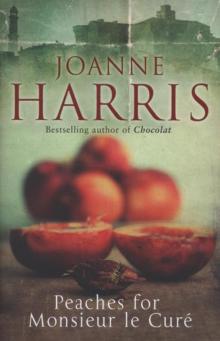 Peaches for Monsieur Le Curé
Peaches for Monsieur Le Curé Blueeyedboy
Blueeyedboy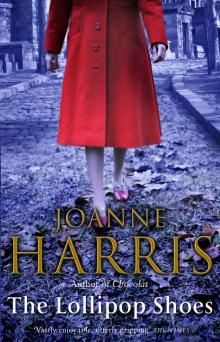 The Lollipop Shoes
The Lollipop Shoes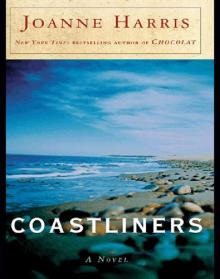 Coastliners
Coastliners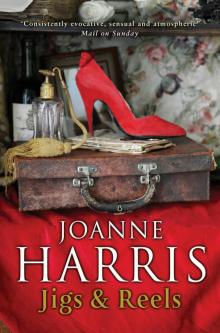 Jigs & Reels
Jigs & Reels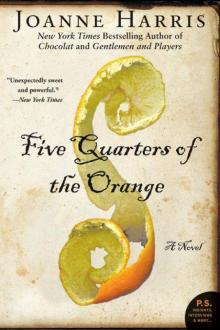 Five Quarters of the Orange
Five Quarters of the Orange